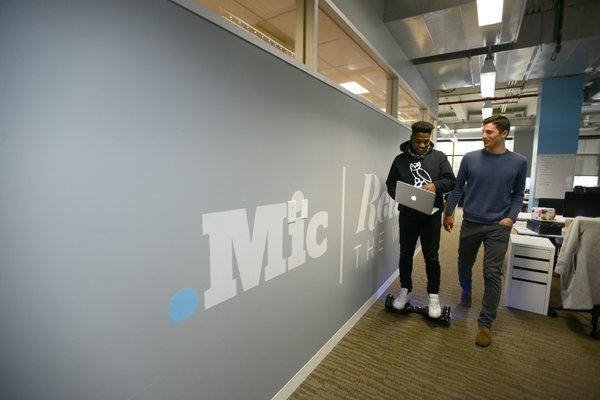Last weekend, on Nov. 29, the digital news company Mic announced that it would be laying off the majority of its 100-person staff as the publication would be acquired by Bustle Digital Group. Once at the vanguard of millenial news publication, Mic was a darling upstart that lured reporters from prominent newsrooms like NPR, The Washington Post and more. The loss of Mic rightfully deserves its mourning period, but it is also warrants a good, hard look at what brought its demise in the first place so that other teetering publications don’t fall into the same trap.
Former employees allege Mic relied too heavily on scandal-laden Facebook, after the platform provided $5 million in funding for a Mic-produced show, Mic Dispatch, that would broadcast on Facebook Watch. When Mic Dispatch was first announced, Facebook said, “‘Mic Dispatch’ reveals the world as we see it: complicated, diverse and full of potential” Mic had expected the partnership to last at least a year, but according to The New York Times, “just before Thanksgiving, the social network suggested that, in 2019, it would effectively cancel the show.”
The impending cancellation of Mic Dispatch was the final nail in the publication’s coffin. Admittedly, Mic’s recent staffing decisions, which were coated in hubris, may have contributed to it — in late 2017, Mic announced that it would be laying off 25 people, primarily from the news and editorial departments, as part of a pivot-to-video trend that other newsrooms were adopting. Few could have foreseen that this move essentially allowed Mic to cannibalize itself. At its face, the decision made sense: video is the fastest growing facet of internet traffic, and ad revenue concentrates in video. But I did say “few” a couple sentences ago. Those few could have realized that Facebook, who had spent several years prior touting the future of video and its guaranteed bounty, admitted in 2016 that it had artificially inflated statistics surrounding video ads for two years. Billions of undeserved advertising dollars poured into Facebook’s coffers, while it kept mum about its advertising misdirection. Further, more than a month before Mic’s acquisition, Facebook was taken to a federal district court in California for a lawsuit alleging that the company knew about the inflation more than a year before it was first reported in 2016.
Facebook led advertisers and media publications to believe that prioritizing video over text would accrue the most revenue and, more direly, would allow the media industry to save itself. And the industry is yet again facing the stark revelation that companies as powerful as Facebook now have overwhelming control of the news market, thus excising the necessity of consumer-led decisions. Even in the ‘free’ market, people’s autonomy is being driven out of existence.
And we should never forget that real people are the most affected by anything a corporation does to benefit themselves. Talented individuals have lost their jobs and have been silenced as Facebook’s machinations proved more powerful than the desperate need for honest journalism today. Facebook’s push to fund video series like Mic Dispatch come from distrust that stems from Russia’s interference with the 2016 presidential elections, and the company is still in the midst of recovering from the Cambridge Analytica scandal and the fake news circulation on its algorithms. But it seems that blow-out-of-the-water scandals like those are the only ones that even provide a semblance of accountability. Pivot-to-video is akin to an urban legend that will only drive news media like Mic to destroy itself, and chances are, Facebook will get off scot-free.
With my vague understanding of the markets and a couple runs of “The Big Short” (2015), I see Facebook’s mess with pivot-to-video as a digital microcosm of the 2008 housing market crash. Like Facebook and video ad revenue, big banks falsely advertised the security of subprime mortgages. Both entities, with capital and resources bountiful enough to survive most setbacks, built a house of cards and reaped the benefits of it. But when the house of cards inevitably came tumbling down, the big banks survived, helped along with a federal bailout and nothing more than slaps on the wrist. Certainly, the banking crisis was much more calamitous.
But the mere fact that people’s lives can be completely upended at the ephemeral whims of a multi-billion dollar company is shameful. Good journalists will be lost into a cavernous freelancing market, and good journalism has been silenced. Granted, Mic’s management did make some very boneheaded decisions. This does not mean an entire news organization should go away. Facebook’s power has not just devoured Mic; it has affected everything from the largest publications to your local town papers. It’s not a total exaggeration to say that pivot-to-video is the worst thing to happen to the media industry yet. Others may argue that fake news holds the top spot, but we all know about fake news and Congress, as technologically-challenged as they may be, is on the case. But pivot-to-video is becoming one of those things that the general public will accept as logical — and to a certain extent it might as well be — to the point where the public, which unfortunately includes members of the press and its management, will delude itself into thinking it’s true. The delusion will last only so long as Facebook does not pivot again, playing on another ephemeral whim, leaving those who had chased video down an unending path stranded. Whether news media will survive that next pivot is really up in the air.




